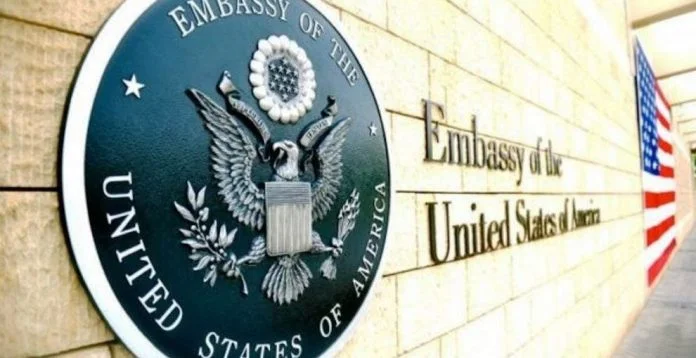751
By Oscar Okhifo
The United States Embassy in Nigeria has raised fresh concerns over the alarming rate at which Nigerian state Governors are spending public funds on luxury buildings, despite widespread poverty, rising inflation, and deteriorating public services across the country.
In a post shared on its official X (formerly Twitter) handle, the U.S. Mission spotlighted a report by The Africa Report that detailed how various state governors have splashed billions of naira on the renovation or construction of government houses and legislative buildings. The embassy noted that this pattern of “fiscal irresponsibility” not only fuels inequality but also erodes public trust in governance.
The report, which has since stirred reactions across civil society, highlighted that Oyo State Governor Seyi Makinde approved a staggering ₦63.4 billion to renovate the Government House, surpassing the state’s allocations to health, agriculture, and pension combined. This was reported by pointblanknews.com.
Similarly, Gombe State reportedly earmarked ₦14.9 billion for a new Governor’s residence and ₦14.23 billion for a new House of Assembly complex in a state ranked among Nigeria’s poorest.
Across several other states, including Zamfara, Bauchi, Benue, Anambra, and Kano, similar renovation projects have consumed state funds totaling nearly ₦200 billion between 2023 and 2025.
Analysts say these expenses represent a stark misplacement of priorities in a country where millions lack access to decent housing, healthcare, and quality education.
But the extravagance is not restricted to the subnationals. Critics say state governors may have simply taken cues from the Federal Government, which has never loved by example. The FG has at various times been accused of wasteful spending amid worsening living conditions for the masses.
A year or so ago, there was public uproar over billions allocated to renovate the Vice President’s official residence, even as millions of Nigerians remain homeless or displaced. They Carried out the project.
The Federal Government, through the Ministry of the Federal Capital Territory, also went ahead with the renovation of the International Conference Centre in Abuja at an enormous cost of N38 billion, despite widespread condemnation.
There was also public disapproval over billions used to purchase brand-new Prado SUVs for federal lawmakers, as well as the controversial purchase of a yacht, a new jet for the Presidency, and the installation of solar lights in Aso Rock . The hoopla and complains and disapprovals cut no ice.
All these spending are not profitable . They only took from the economy at a time when inflation hovers near 24%, fuel prices quadrupled, and over 60% of Nigerians live below the poverty line.
“These spending patterns reflect a disconnect between the political elites and the everyday realities of Nigerian citizens,” said BudgIT, a civil society organisation monitoring public finance.
“Instead of fixing schools and clinics, our leaders are busy beautifying the places where they stay and work.”
The U.S. Embassy’s intervention, though subtle, underscores growing international concern over governance and accountability in Nigeria. It raises the question: will this quiet rebuke by a foreign partner prompt any rethink among Nigeria’s power holders?
So far, the signs are not encouraging.
In spite of public disapproval, the Federal and state Governments have largely gone ahead with the controversial projects, ignoring calls for austerity, transparency, and citizen-focused budgeting.
As the cost of living crisis deepens and Nigeria’s fiscal space shrinks further, many fear that the poor, who are already down, will continue to stay down or even sink deeper into despair and despondency.
Whether the latest concerns from the U.S. will serve as a wake-up call for Nigeria’s leaders to curb their excesses remains to be seen.
The question is; Why is it so hard for these public office holders to practice what they preach? Will there ever be sanity in this space? Time, indeed, will tell.



